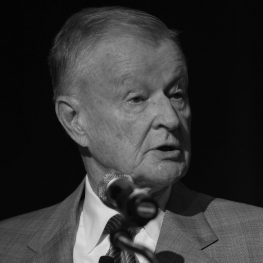Zbigniew Brzeziński †
National Security Adviser to US President Jimmy Carter (1977-1981)
Counselor and Trustee, Center for Strategic & International Studies; and Professor of American Foreign Policy, the Paul Nitze School of Advanced International Studies, Johns Hopkins University, Washington, DC.
From 1977 to 1981, National Security Adviser to the President of the United States. In 1981, awarded the Presidential Medal of Freedom “for his role in the normalization of U.S.-Chinese relations and for his contributions to the human rights and national security policies of the United States.”
Other Current Activities
Public and Pro Bono Honorary Chairman, AmeriCares Foundation (a private philanthropic humanitarian aid organization); Member, Board of Trustees, International Crisis Group; Member, Board of Directors, Polish-American Enterprise Fund and of the Polish-American Freedom Foundation; Member, Honorary Board of American Friends of Rabin Medical Center; Member, International Honorary Committee, Museum of the History of Polish Jews in Warsaw, etc.
Private Sector International adviser to major U.S./global corporations; frequent participant in annual business/trade conventions; also a frequent public speaker, commentator on major domestic and foreign TV programs, and contributor to domestic and foreign newspapers and journals.
Past Activities
U.S. Government 1966-68, Member of the Policy Planning Council of the Department of State; 1977-1981, National Security Adviser to the President; 1985, Member of the President’s Chemical Warfare Commission; 1987-88, Member of the NSC-Defense Department Commission on Integrated Long-Term Strategy; 1987-89, Member of the President’s Foreign Intelligence Advisory Board (a Presidential commission to oversee U.S. intelligence activities).
Public and Political 1973-76, Director of the Trilateral Commission; in the 1968 presidential campaign, chairman of the Humphrey Foreign Policy Task Force; in the 1976 presidential campaign, principal foreign policy adviser to Jimmy Carter; in the 2008 presidential campaign, very early and prominent public supporter of Obama. In 1988, co-chairman of the Bush National Security Advisory Task Force. Past Member of Boards of Directors of Amnesty International, Council on Foreign Relations, Atlantic Council, the National Endowment for Democracy; Co-Chairman, American Committee for Peace in the Caucasus. 2004, Co-Chair, Council on Foreign Relations-sponsored Independent Task Force, Iran: Time for a New Approach.
Academic On the faculty of Columbia University 1960-89; on the faculty of Harvard University 1953-60. Ph.D., Harvard University, 1953; B.A. and M.A., McGill University 1949 and 1950. Latest book authored is The New York Times best seller, STRATEGIC VISION: America and the Crisis of Global Power. His previous book, AMERICA AND THE WORLD: Conversations on the Future of American Foreign Policy, was coauthored with Brent Scowcroft and moderated by David Ignatius. He is also the author of SECOND CHANCE: Three Presidents and the Crisis of American Superpower; THE CHOICE: Global Domination or Global Leadership; THE GRAND CHESSBOARD: American Primacy and its Geostrategic Imperatives; the best-selling THE GRAND FAILURE: The Birth and Death of Communism in the 20th Century; OUT OF CONTROL: Global Turmoil on the Eve of the 21st Century; GAME PLAN: How to Conduct the U.S.-Soviet Contest; POWER AND PRINCIPLE: Memoirs of the National Security Adviser, 1977-1981; THE FRAGILE BLOSSOM: Crisis and Change in Japan; BETWEEN TWO AGES: America’s Role in the Technetronic Era; THE SOVIET BLOC: Unity and Conflict; and of other books and many articles in numerous U.S. and foreign academic journals.
Professor Zbigniew Brzeziński about EAD: “I have enjoyed the discussion with the students of the European Academy of Diplomacy enormously and, more importantly, I was very much impressed by the initiative you have undertaken. It represents a new Poland, the Poland of the 21st century, and a Poland for the first time in an extremely long time that is geopolitically entrenched in something larger than itself and yet friendly to Poland’s national identity and political sovereignty. By training a new generation of Polish diplomats, EAD is rendering a real national service.”

